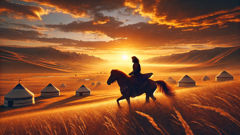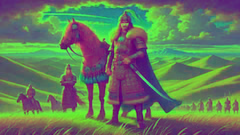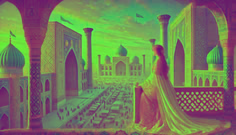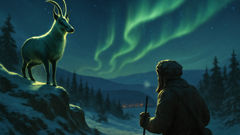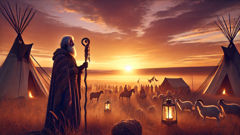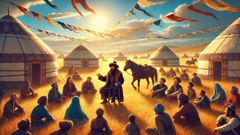Introduction
Across the vast mosaic of Uzbekistan, where the earth breathes in long, patient waves beneath the endless sky, there are songs that outlive their singers. In one such song, hoofbeats measure time and a single name rings like a bell: Alpamysh. He is a figure whose shadow stretches across the steppe and into the warm courtyards of villages, where tea is poured and stories are retold. This is not the simple story of a man who rides forth and returns; it is an account woven from the colored threads of kinship, oath, and the relentless loyalty between a warrior and his horse. In the cool of dawn, when mist rolls off the low hills and the first light gilds the silk of domes and the braided manes of stallions, Alpamysh mounts a chestnut steed whose eyes know the taste of wind. His bride, taken from the circle of their camp by a rival stronghold across the desert, is more than a prize—she represents honor, the binding of families, and a promise to future children that the world still keeps its debts. The journey that follows threads through salt flats and riverbeds, through marketplaces that still trade in spices, lullabies, and ancient grudges; it meets mountains that echo the voice of fate and fortresses that hold more than stone. Through song and silence, through alliances forged by shared bread and betrayals sharpened by greed, Alpamysh’s quest becomes a map of a people’s courage. This retelling gathers sensory detail—smell of fermented mare's milk, the rasp of felt against leather, the way stars fall across a tent at the edge of winter—to evoke not only a hero’s trials but the living culture that shaped him. Here on the page, the steppe spreads once more: a place where loyalty is measured in journeys, where a horse is both companion and compass, and where love can demand an odyssey of blades and bargains. The Epic of Alpamysh is at once a rescue and a reckoning, an offering to the deep-rooted traditions of Uzbekistan and to anyone who listens for the steady drum of a brave heart.
The Call of the Steppe and the Oath at Dawn
Alpamysh was born in a season when the rivers ran high and the shepherds spoke in hushed, grateful tones. He grew to a man whose presence matched the open places he loved: broad-shouldered, deliberate, with a laugh that opened slowly like a gate. In the villages that lined the tributaries, elders would nod when his name passed their lips. He learned the shapes of sky and weather before he could read clearly the marks of a sword. By the time he was old enough to string arrows and mend the leather of saddles, his reputation spread further than the fences of his family’s pastures. They said Alpamysh had the eye of a falcon and the steadiness of the oldest mare in their herds. These were not idle words: to be taken seriously on the steppe is to be tested by seasons, by theft, by hunger, by the ever-looming claim of stronger men. Alpamysh’s courage grew in the same rhythm as bread baked on hot stones, as chinks of laughter around a campfire.
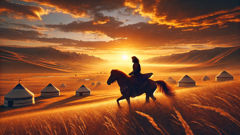
When he first met Jupar, who would become his bride, it was as if two chords tuned themselves to the same pitch. Jupar moved with a quiet, fierce grace; she understood the barter of glances, the language of sewing needles, of song, and of a glance that could ask for another life. Their wedding was a blend of ritual and laughter: elders circled to pronounce blessing, mothers braided hair with silver strands, and the whole community raised their voices until the stars dropped like white seeds into the night. On the third day, after the guests departed and the tents stilled, a new danger arrived on the wind—an old wound of the region, the ambition of a belligerent chieftain who believed that to increase his honor he must seize another’s joy. This man, who styled himself a khan across the southern salt-lands, watched the celebration from afar. He owned a fortress that cast a long shadow across the caravan routes and kept men who traded not only in goods but in captive women and contested promises. One night his raiders slid like wolves into the camp. Under a moon so thin it could have been a sickle, Jupar was taken. Alpamysh awoke to emptiness where a warm hand had been; the sound of hooves was gone but for one long, accusing silence.
The oath he made at dawn was small in words but vast in will. Before the wooden stakes of the family tent, after spitting first into the earth as is the custom to declare truth, Alpamysh swore by the sky and the ancestors that he would find Jupar, come wind or frost. He bound his fate to his horse—an animal named Kökbala, whose lineage was whispered among breeders as a horse that could remember its rider’s sorrow. The bond between man and steed became sacred: Kökbala would carry Alpamysh through dunes and across rivers, but loyalty, too, must be fed—by grass, water, and mutual trust. Their first days away from the safety of kin were a kind of schooling. They traversed sun-hammered salt flats where mirages made the world uncertain, they threaded valleys where shepherds recognized Alpamysh and gave him bread, and they crossed the great market towns where caravans from the Silk Road hummed with colors and deals. With every mile, the story of the kidnapped bride spread like the scent of cooking plov. Some offered help—a trader whose son had been taken once, an old craftsman who owed a debt of honor; others shuttered their doors, fearing the retribution that followed interference. It became clear that the khan’s fortress did not only rely on walls and soldiers but on alliances with merchants and a web of fear. Thus Alpamysh learned that brute force alone would rarely open metal gates; he would need intelligence, alliances, and the sort of patience that belongs to the earth itself.
Their nights were a study in small mercies: two travelers beneath a sky of stars, sharing stories with caravaners who had a map of human sorrows, trading song for directions. Alpamysh’s presence grew larger in villages because he listened. He learned the names of rivers by their taste, the routes of hidden passes by how moss grew on stones, the rituals that might sway a guard with a kind word rather than a blade. Kökbala, ever watchful, found the thin trails that saved days of travel. Each bend in the road brought a new test. In the salt-lands they were nearly drowned by a sandstorm that moved like liquid stone; in a mountain pass they faced a band of brigands who demanded tribute. In those skirmishes Alpamysh did not revel in killing—he fought with a measured fury, aiming to end threats without letting vengeance hollow him. The world he traveled through was neither wholly kind nor wholly cruel; it contained a spectrum of loyalties, and he learned to read the delicate language of favors and favors returned. It was in this weaving of alliances and encounters—more than in a single, thunderous battle—that Alpamysh’s campaign found its careful, human rhythm. Each handshake, each shared bowl of soup, nudged him closer to the fortress where Jupar was kept, and each small kindness would, when the time came, return like a cluster of protective hands.
Alpamysh's path to the khan’s fortress required patience and cunning. He skirted the main roads, preferring old animal tracks across salt flats and shepherd trails through gorges. He traded songs with a caravan of silversmiths who, in exchange for a promise to protect their goods, whispered about a weak gate and a guard who drank heavily. He befriended a smith's son who secretly passed along a crude map to the fortress, drawn with ash by a lantern. Night after night the plan grew: to use the weight of the people’s memories, the loyalty of those indebted to him, and his horse's tireless stride to move not as a conqueror but as a precise instrument of rescue. For in the heart of the fortress, Alpamysh believed, Jupar’s spirit remained intact like a small flame in a storm. To save it, he needed allies who did not fear the khan’s name. He found them in the places where the khan’s reach frayed: in a widow’s kitchen that had once fed men on both sides of a border, in the laugh of a young stablehand who admired Alpamysh’s refusal to lie, and in the quiet nod of a caravan leader who knew the route of the fortress’s supply chain. By the time the final night arrived, Alpamysh carried a map more cartography than legend: it was the history of favors tucked into his belt, the names of debtors and allies stitched into his memory, and the cadence of his horse's hooves, which sounded like a gathering storm edged with purpose.
Siege, Cunning, and the Return to the Yurt
The fortress that loomed above the khan’s territory was a study in deliberate intimidation: high walls of baked mud and stone, spikes at its gate, and towers that sliced the sky. Around it, the khan had arrayed men whose loyalty was less anchored by blood than by coin and fear. Alpamysh took stock of what he and his allies could manage. A direct assault would bring the clatter of death and a ruinous price; instead, their plan relied on diversion and the delicate art of misdirection. They waited as predators wait, learning the patrols' rhythm, the timing of gate openings, and the mood of the guards after wine. In those moments the steppe taught patience, and patience became a weapon sharper than any sword.
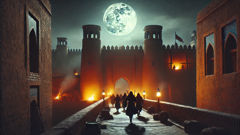
The first movement was simple and theatrical. Under a moon diffused like milk, Alpamysh and three companions lit a string of small fires at a distance from the fortress to draw attention to the hills. The khan’s men, thinking a raiding party pressed the perimeter, moved to intercept. At the same time, a caravan—arranged by a man who had once been offered sanctuary by Alpamysh’s family—rolled through the eastern road, presenting bundles and wagons that masked the approach of those who would enter the fortress unseen. Alpamysh, cloaked as a trader, moved among the wagons and slipped within the shadow of the wall with Kökbala quiet beneath him. The animal's steps were a lesson in restraint; he had been trained to refuse the rattle of the market and to become almost an extension of Alpamysh’s will. By dawn the fortress had been entered not by siege engines but by the soft work of human cunning.
Inside, a maze of courtyards and narrow corridors tested every skill they had cultivated. The khan’s household was a small world: servants, foreign merchants kept for their craft, guards whose ambition was a thread thin enough to be snipped by promises. Alpamysh did not storm through with fanfare; instead, he moved like a shadow guided by a single, burning aim. In the kitchens he learned which commoners had hearts he could sway; in the stables he found men who remembered being paid for grain and were willing to return the favor. A cook, grateful for a memory of kindness years earlier, offered a key hidden in the heel of a bread oven. A guard, disgruntled by weighty taxes, closed his eyes long enough for Alpamysh to pass. Each small mercy was a stone with which to build the larger edifice of rescue.
When he found Jupar, she wore a calmness that spoke of private endurance rather than surrender. Her eyes had the same quiet fire he loved, but there was also the understanding of someone who had learned the limits of fury and the reach of restraint. Their reunion was not a sudden release but a careful exchange of glances and words that carried the weight of promises. She had been held behind a lattice of doors and watched by women who were more prisoners of circumstance than allies to the khan. Alpamysh’s approach was not theatrically violent; he offered the women the hope of a future less bent by fear and asked them to trust his hands to lift Jupar. They obliged because in their eyes he carried the proof of a man who did not take life with casual cruelty.
Escape was a braided affair of timing, luck, and the fidelity of Kökbala. The horse, who had endured long nights and the seasons’ hunger, now became the axis of their departure. Alpamysh mounted, Jupar beside him, and they slipped out by the same route a supply wagon might take. At one small outpost the khan’s kennel barked a warning; a stablehand—once the lover of a woman Alpamysh had saved—screamed as if by habit, providing the distraction needed. Rushing through the open air, they felt the world widen: sky was space again rather than a ceiling, wind pressed against faces like a friend, and the cadence of hooves was a hymn. The khan’s men pursued, of course. The chase that followed leapt from low hills to salt marshes, through reeds that slapped like hands and across a river that refused to be simply crossed. Kökbala darted along shallow fords where other horses sank; Alpamysh guided his mount with a mixture of soft words and firm hands. On the far side, a prepared band of allies waited, ready to blunt the pursuit. The final clash was quick and thunderous, but Alpamysh’s careful accumulation of favors paid off: the khan’s men were routed by a coalition that had little appetite for tyranny.
Their return journey stitched a different kind of story. No longer a man fleeing with a stolen bride, Alpamysh was now a leader who carried Jupar back into the community whose feet had always known the contours of the land. The crossing back through markets and encampments was celebratory and sobered by losses. They found people who had paid, in small ways, for the khan’s arrogance: fields that had been plundered, families who lost sons. Alpamysh insisted reparations be made where possible; he knew that a hero's return without repair could ring hollow in the very places that gave him strength. The wedding tent that received them had a new weight: celebration was tempered by memorials to those who had fallen. In the end, the steppe itself seemed to approve. In a night of clear stars, drums sounded, horses pranced, and the elder who had first blessed Alpamysh's oath pronounced not only the union of two hearts but the reaffirmation of a people’s willingness to stand for one another.
Years later, the story of the rescue became a lesson taught by mothers to children, not merely as a tale of heroism but as a map of obligations. Alpamysh taught the next generation that courage without compassion can fray into cruelty, that a horse’s loyalty must be earned and honored, and that the steppe demands reciprocity. The khan's fortress fell into a quieter fate; without the fear that had girded it, its men scattered like seeds. Jupar and Alpamysh raised a household where songs of their passage were sung beside lullabies. Kökbala lived to old age, its mane threaded with silver, and when it finally left the world it was with a dignified stillness, honored by all who remembered. The tale of the rescue therefore remained not just the story of a man and a horse but a small epic about how communities stitch themselves back together after violence: by tending, by trade, by the slow work of remembering. The Epic of Alpamysh endures because it teaches that a single oath can ripple outward, repairing and reshaping the places it touches, and because it gives voice to a culture whose landscape—of mud, of velvet steppes, of market colors—remains as much a character in the story as any human heart.
Conclusion
When the story of Alpamysh is told beside a slow fire, it is not offered only as a spectacle but as counsel. Its rhythm pulses with indispensable lessons: how a person earns honor through measured deeds, how loyalty must be sustained by mutual care, and how a brave heart is most noble when it is tempered by compassion. In the memory-work of Uzbekistan’s villages and cities, Alpamysh remains a guide, not a relic—an emblem of an ethic that values rescue over revenge, community over solitary glory. The horse that carried him is remembered as much for its patience as its speed; the bride whose rescue inspired a campaign is honored for her endurance and agency. Together, they shape an epic that ties love to the duty of protection and binds the individual to the shared fate of a people. This retelling aims to preserve the sensory world of that epic—the straw-scent of a yurt, the crack of cold air on early mornings, the hush after an urgent night—so the tale can serve both as cultural memory and as an invitation: that courage, when rendered modest and cooperative, can repair what violence has undone. The Epic of Alpamysh therefore remains vital because it teaches us how to move through the world with bravery that mends: a model for lovers, riders, and communities who must still, in every age, choose who they will be when faced with loss.

